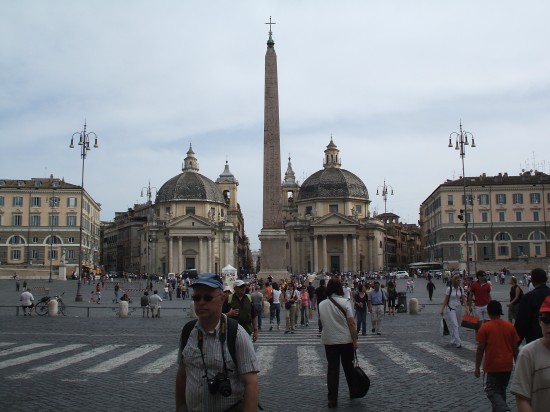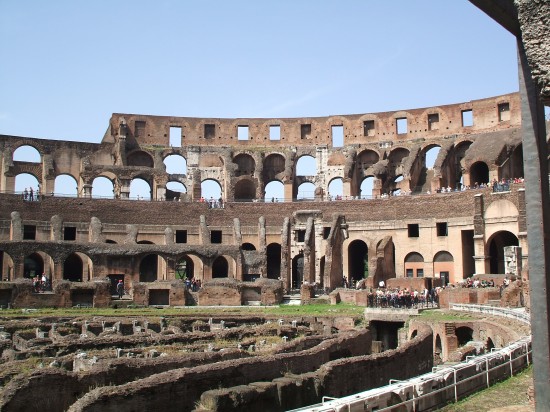
Matthew followed Jack through alleyways, down streets, and across the river before his friend finally came to an abrupt halt in another piazza. “Hey look, Matthew,” he said brightly, sounding not nearly as out of breath as he deserved to be after running for at least a mile nonstop. “It’s another one of those whatchacallits—obelisks, right?”
Matthew clutched his knees and sagged toward the ground, unable to respond. If he had been able to speak he could have told Jack that he was technically right, and that the object before them was, in fact, an obelisk. He would also have been obliged to point out that Rome (and various other European cities, for that matter) was littered with obelisks, that these obelisks had no deeper purpose than to look cool, and that by this point they had no more to do with Egypt than french fries had to do with France. Since he was still recovering his breath, however, all he could do was attempt to get his meaning across by means of a painful wheezing noise.
“Wait here for a second. I’m going to go check it out.” Matthew had no choice but to wait there; moving was still not an option. So he stood there, panting, while his friend went over to examine the obelisk. Eventually, when he was able to muster the energy, he put his hands back in his pockets, because there were a fair number of people in the area and there was no way of telling which of them might be out for his wallet and passport.
Jack came back, shaking his head. “I can’t make heads or tails of this Egyptian stuff,” he said, disappointed that he had not discovered his own personal Rosetta Stone in the past half an hour. “Oh, hey, do you think we lost them?” he asked, seeming to suddenly remember that they had just been “escaping” from the Swiss Guard.
After having taken time to collect his thoughts, Matthew was relatively certain that, had the guards actually been chasing them at any point, they would have been caught. What he said to his friend, however, was: “Yes, if by ‘them,’ you mean our minds!”
“Huh?” said Jack, his smile faltering. He had been just about to boast of escaping certain death at the hands of the Vatican enforcer squads. “What do you mean?”
“You’re right,” Matthew responded harshly. “I should clarify: you’ve lost your mind, and I’ve just somehow managed to become infected by your craziness!”
Jack frowned. “Are you saying . . . that I should have waited until I had more evidence before confronting the guards?”
“I’m saying that you’re completely insane for thinking that confronting the guards would even be an option!” Matthew tried to calm himself down, and he succeeded, to a certain extent. “I think you’ve been reading too many books,” he said, most likely the only time in his life he would ever make that accusation. “You think that just because we’re in a big city with a lot of history there must be some sort of ancient mystery or massive, global conspiracy that we’re supposed to unravel. But real life isn’t that dramatic. Those kind of cheesy adventures don’t actually exist, and even if they did, do you really think that we would be the ones that are supposed to do all that stuff? We’re not secret agents or spies. We’re just two ordinary people.”
Jack regarded Matthew with a peculiar look on his face. “So what do you think we’re supposed to do here?” he asked.
“What anyone else does, of course! Stroll around, see the sites, take pictures. Gawk at things that seem strange to us but are perfectly normal to the people that live here. I want to walk through historical places and visit art museums. I don’t want to spend my time running away from dangerous people who may or may not be pursuing us.”
“You want to be a tourist?” Jack asked, making a sour face.
“Yes! What’s wrong with being a tourist? That’s what people like us do. We tour. Leave the sensational intrigue to the hack novelists.”
Jack stared at his old friend for a long time, as other people, Romans and tourists alike, flowed around them. Matthew was a little unnerved, because he was not used to seeing his friend look so thoughtful. Then again, he was no longer racing around and making loud, public accusations, so maybe it was a change for the best.
Eventually Jack smiled. “You don’t believe that there’s any adventure left in the world, huh? What a sad life you must live, Matthew. But don’t worry. I’ll make a believer out of you yet.” Matthew groaned. So much for change. “I’ll tell you what, though,” Jack continued, “I’ll let you pick where we go tomorrow.”
“So,” said Jack, after Matthew had spent a few minutes trying to figure out if he knew of anywhere they could go where his friend wouldn’t fly off the handle and get them into an awkward situation. “Tell me about this place.”
Matthew looked around, examining his surroundings for the first time since they had arrived. “This must be the Piazza del Popolo,” he declared. “You can tell by those twin baroque churches over at the opposite end, the Santa Maria dei Miracoli and the Santa Maria in Montesanto. Way back in ancient times this was the site of the Flaminian Gate, where the Flaminian Way left Rome to head north.”
Jack scratched his chin and looked thoughtful again. Matthew worried that his friend was coming up with a new conspiracy theory, possibly linking the ancient Egyptians to some sort of mutant “pizza people.” Instead, he said, “If this is where that road left Rome . . . then that means we must be in Rome now, right?”
“Yes,” said Matthew, “this is actually part of Rome.”
“Hey!” Jack smiled broadly and slapped a friendly arm around Matthew’s shoulder. “Welcome to Rome.”
 No Comments »
No Comments »


